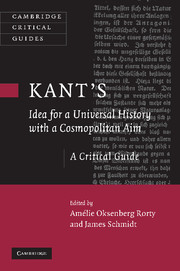Book contents
- Frontmatter
- Contents
- List of contributors
- List of abbreviations
- Introduction: history as philosophy
- Idea for a Universal History with a Cosmopolitan Aim
- 1 Teleology and history in Kant: the critical foundations of Kant's philosophy of history
- 2 The purposive development of human capacities
- 3 Reason as a species characteristic
- 4 Good out of evil: Kant and the idea of unsocial sociability
- 5 Kant's Fourth Proposition: the unsociable sociability of human nature
- 6 The crooked timber of mankind
- 7 A habitat for humanity
- 8 Kant's changing cosmopolitanism
- 9 The hidden plan of nature
- 10 Providence as progress: Kant's variations on a tale of origins
- 11 Norms, facts, and the philosophy of history
- 12 Philosophy helps history
- Bibliography
- Index of names and works
Introduction: history as philosophy
Published online by Cambridge University Press: 28 July 2009
- Frontmatter
- Contents
- List of contributors
- List of abbreviations
- Introduction: history as philosophy
- Idea for a Universal History with a Cosmopolitan Aim
- 1 Teleology and history in Kant: the critical foundations of Kant's philosophy of history
- 2 The purposive development of human capacities
- 3 Reason as a species characteristic
- 4 Good out of evil: Kant and the idea of unsocial sociability
- 5 Kant's Fourth Proposition: the unsociable sociability of human nature
- 6 The crooked timber of mankind
- 7 A habitat for humanity
- 8 Kant's changing cosmopolitanism
- 9 The hidden plan of nature
- 10 Providence as progress: Kant's variations on a tale of origins
- 11 Norms, facts, and the philosophy of history
- 12 Philosophy helps history
- Bibliography
- Index of names and works
Summary
Lively current debates about narratives of historical progress, the conditions for international justice, and the implications of globalization have prompted a renewed interest in Kant's Idea for a Universal History with a Cosmopolitan Aim. The nine Propositions that make up this brief essay raise a set of questions that continue to preoccupy philosophers, historians, and social theorists. Does history, whether construed as a chronicle or as a set of explanatory narratives, indicate anything that can be characterized as meaningful? If so, what is its structure, its rationale and direction? How are we to understand the destructive and bloody upheavals that constitute so much of human experience? What connections, if any, can be traced between politics, economics, and morality? What is the relation between the rule of law in the nation state and the advancement of a cosmopolitan political order? Can the development of individual rationality be compatible with the need for the constraints of political order? Does the study of history convey any philosophical insight? Can it provide political guidance?
Kant's nine propositions subtly and implicitly express – and recast – some of the philosophical sources of his views: the voices of the Stoics and Augustine are heard clearly; and although Kant had reservations about Grotius, Hobbes, Leibniz, and Rousseau, their contributions, along with those of Mandeville and Adam Smith, are manifest in the Idea for a Universal History.
- Type
- Chapter
- Information
- Publisher: Cambridge University PressPrint publication year: 2009
- 1
- Cited by

